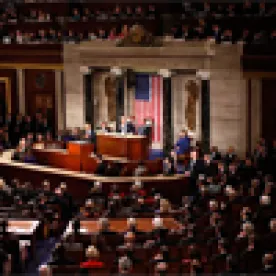The Republican leadership of a congressional oversight committee has started investigating inter-agency communications in response to the Obama Administration’s attempts to hold business franchisors accountable for labor law violations of their franchisees.
Last August, the National Labor Relations Board (NLRB) issued a highly controversial decision that expanded the definition of employer to include those with indirect control over many employment decisions. The ruling came after Richard Griffin, NLRB’s General Counsel, asserted that a national fast-food chain was a joint employer with various franchises. That same month a draft confidential memorandum surfaced within the Department of Labor (DOL) that proposed criteria in which a franchisor could be held liable as a joint employer with its franchisees for violations of Occupational Safety and Health Administration standards. DOL has described the contents of the document as “an investigatory tool” designed for information collection by OSHA’s compliance officers.
In response, in a letter in October 2015, the House of Representatives Committee on Education and the Workforce requested information from DOL on what the Committee deemed was a proposed change in health and safety enforcement, as outlined in the draft memorandum. The request included information on the interaction between OSHA and other DOL agencies regarding modifications to OSHA’s multi-employer citation policy, DOL’s communications with NLRB, and DOL’s legal justification for the changes.
The DOL responded in a letter the following month, which, in part, stated that there had been no coordination between DOL and NLRB on OSHA’s draft memorandum. “The Department did not coordinate with the Board [NLRB] in crafting the tool provided for CSHOs [OSHA’s Compliance Safety and Health Officers],” wrote Adri Jayaratne, DOL’s Acting Assistant Secretary for Congressional and Intergovernmental Affairs.
However, in correspondence dated January 19 to Secretary of Labor Tom Perez, Committee leadership accused DOL of being non-responsive to its information request. In addition, based on information the Committee obtained separately from NLRB, lawmakers contended that three communications between DOL and NLRB last summer raised concerns “about the veracity of the Department’s November 18 response.” The interactions involved alleged invitations for Griffin to participate in a video conference and a panel discussion with members of DOL’s Office of the Solicitor, and an email exchange in which a DOL attorney specializing in occupational safety and health asked Griffin for an NLRB contact who had knowledge of ongoing NLRB multi-employer liability litigation.
“This new information — and the Department’s unwillingness over a period of months to fully cooperate with the Committee’s request — calls into question the Department’s respect for Congress’s constitutional oversight authority,” wrote co-authors Representative John Kline (R-Minn.), Committee Chairman, and Representative Tim Walberg (R-Mich.), Chairman of the Workforce Protections Subcommittee. The congressmen gave Perez until January 26 to provide all the information previously sought by the Committee as well as all materials related to the three engagements between the two federal agencies.
Meanwhile, on January 20, DOL’s Wage and Hour Division (WHD) released its interpretation of joint employer liability. WHD Administrator David Weil said joint employment exists when a person is employed by two or more employers in a way that the employers are responsible, both individually and jointly, for compliance with a statute. Under both the Fair Labor Standards Act and the Migrant and Seasonal Agricultural Worker Protection Act, a worker could be employed jointly by two or more employers who are both responsible, simultaneously, for compliance, Weil said. (For more on this, see our article, U.S. DOL Issues Guidance on Joint Employment under the FLSA and MSPA.)
Taking note of the WHD policy, Congressman Walberg said in a statement, “This is part of a larger effort that will threaten the livelihoods of small business owners and destroy opportunities for workers and entrepreneurs to succeed in today's economy.” He predicted the effect of the Administration’s “outdated policies” on entrepreneurs will be to “hold them back.”
The Administration’s aggressive actions on joint employer liability are fraught with far-reaching legal ramifications. For that reason, employers operating on multi-employer worksites or as franchisors should seek guidance from knowledgeable counsel on just how to respond.




 />i
/>i

